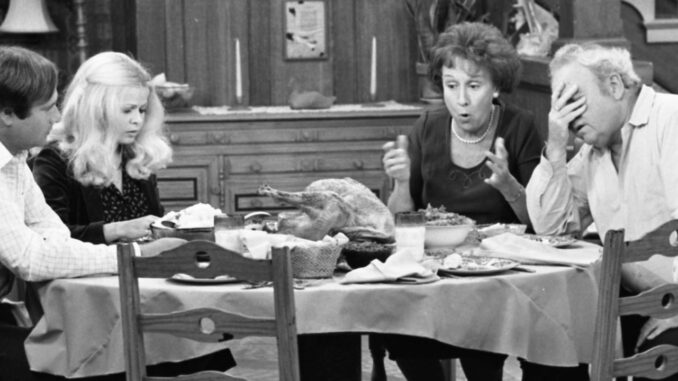
In March 2022, Ed Martin revisited the groundbreaking television series All in the Family and its legacy as a provocative and influential classic. Ainsley Andrade, a younger colleague, was asked to watch a few episodes and critique the show from the perspective of someone born after its original run (1971-1979). Martin, a fan who had watched the series when it first aired, wondered what someone unfamiliar with the context of the show, and especially its controversial central character, Archie Bunker, would think of it today.
All in the Family is famous for presenting a racist, bigoted, yet somehow sympathetic character in Archie Bunker (Carroll O’Connor). Through the eyes of Ainsley, who viewed the show in the modern context of heightened awareness around race and prejudice, Archie was less a source of humor and more a figure to be “shut out” and “offended by.” Ainsley’s perspective reflects a broader generational divide in how All in the Family is viewed today—while some see Archie as a tragic figure, a product of his time whose bigotry is exposed for ridicule, others find little humor in such ignorance.
Martin, however, argues that All in the Family should be appreciated for breaking barriers and starting important conversations. He reflects that Archie was always portrayed as a fool—his bigotry never made him appear sympathetic, but instead served as a comedic foil for the progressive characters around him. The show, at its best, was a look at a working-class family under societal pressures, and Archie’s gradual evolution, influenced by his liberal daughter Gloria (Sally Struthers), her husband Mike (Rob Reiner), and his patient wife Edith (Jean Stapleton), was a subtle but important aspect of the series.
The show’s influence is undeniable. It paved the way for more progressive and outspoken television, allowing for the discussion of controversial issues like race, gender, and politics in ways that had not been seen before. However, Ainsley’s critique emphasizes how All in the Family‘s humor may not resonate as easily with today’s audiences, particularly younger generations who have more contemporary, relatable content. But Ainsley also acknowledges the show’s lasting impact on American culture—its influence on future TV programs tackling similar issues, including racial and social justice.
While Archie Bunker’s personal growth was slow and imperfect, it was significant within the context of the show. Even though he never fully abandoned his prejudices, moments of personal enlightenment—like his confrontation with a racist character on Archie Bunker’s Place—demonstrate that the series took the time to explore transformation, even if only partially realized.
The column ultimately suggests that viewers today may not fully appreciate All in the Family without understanding the context in which it aired. At the time, Archie’s bigotry was revolutionary in that it showed the racism and sexism of the average American in a way that wasn’t glorified or justified. In contrast, modern viewers may be less willing to tolerate Archie’s behavior, which might overshadow the potential lessons about growth and change.
Martin concludes with a reflection on generational differences: the very characters who fought for civil rights and social change on the show—Mike, Gloria, and Lionel—were themselves Baby Boomers. This fact humorously contrasts with how many today view their activism, especially among Millennials and Gen Z, highlighting how the political and social issues portrayed in All in the Family continue to be relevant today.
The conversation surrounding All in the Family remains complex and layered, with the show being simultaneously a product of its time and a significant force in shaping how TV would evolve in addressing social issues.
